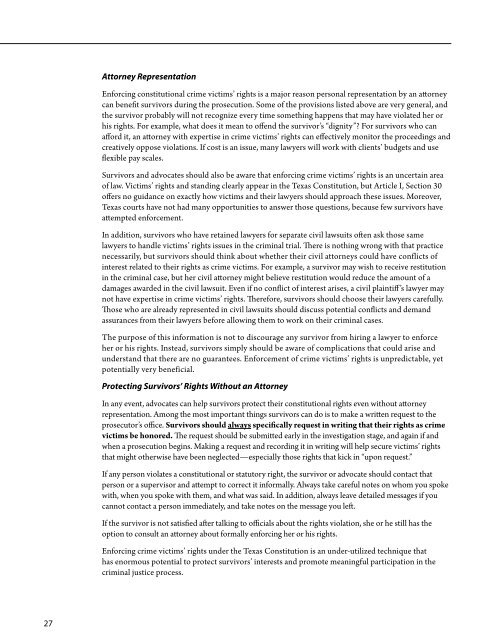Sexual aSSault LEGAL ADVOCACY MANUAL - Texas Association ...
Sexual aSSault LEGAL ADVOCACY MANUAL - Texas Association ...
Sexual aSSault LEGAL ADVOCACY MANUAL - Texas Association ...
Create successful ePaper yourself
Turn your PDF publications into a flip-book with our unique Google optimized e-Paper software.
Attorney Representation<br />
Enforcing constitutional crime victims’ rights is a major reason personal representation by an attorney<br />
can benefit survivors during the prosecution. Some of the provisions listed above are very general, and<br />
the survivor probably will not recognize every time something happens that may have violated her or<br />
his rights. For example, what does it mean to offend the survivor’s “dignity”? For survivors who can<br />
afford it, an attorney with expertise in crime victims’ rights can effectively monitor the proceedings and<br />
creatively oppose violations. If cost is an issue, many lawyers will work with clients’ budgets and use<br />
flexible pay scales.<br />
Survivors and advocates should also be aware that enforcing crime victims’ rights is an uncertain area<br />
of law. Victims’ rights and standing clearly appear in the <strong>Texas</strong> Constitution, but Article I, Section 30<br />
offers no guidance on exactly how victims and their lawyers should approach these issues. Moreover,<br />
<strong>Texas</strong> courts have not had many opportunities to answer those questions, because few survivors have<br />
attempted enforcement.<br />
In addition, survivors who have retained lawyers for separate civil lawsuits often ask those same<br />
lawyers to handle victims’ rights issues in the criminal trial. There is nothing wrong with that practice<br />
necessarily, but survivors should think about whether their civil attorneys could have conflicts of<br />
interest related to their rights as crime victims. For example, a survivor may wish to receive restitution<br />
in the criminal case, but her civil attorney might believe restitution would reduce the amount of a<br />
damages awarded in the civil lawsuit. Even if no conflict of interest arises, a civil plaintiff ’s lawyer may<br />
not have expertise in crime victims’ rights. Therefore, survivors should choose their lawyers carefully.<br />
Those who are already represented in civil lawsuits should discuss potential conflicts and demand<br />
assurances from their lawyers before allowing them to work on their criminal cases.<br />
The purpose of this information is not to discourage any survivor from hiring a lawyer to enforce<br />
her or his rights. Instead, survivors simply should be aware of complications that could arise and<br />
understand that there are no guarantees. Enforcement of crime victims’ rights is unpredictable, yet<br />
potentially very beneficial.<br />
Protecting Survivors’ Rights Without an Attorney<br />
In any event, advocates can help survivors protect their constitutional rights even without attorney<br />
representation. Among the most important things survivors can do is to make a written request to the<br />
prosecutor’s office. Survivors should always specifically request in writing that their rights as crime<br />
victims be honored. The request should be submitted early in the investigation stage, and again if and<br />
when a prosecution begins. Making a request and recording it in writing will help secure victims’ rights<br />
that might otherwise have been neglected—especially those rights that kick in “upon request.”<br />
If any person violates a constitutional or statutory right, the survivor or advocate should contact that<br />
person or a supervisor and attempt to correct it informally. Always take careful notes on whom you spoke<br />
with, when you spoke with them, and what was said. In addition, always leave detailed messages if you<br />
cannot contact a person immediately, and take notes on the message you left.<br />
If the survivor is not satisfied after talking to officials about the rights violation, she or he still has the<br />
option to consult an attorney about formally enforcing her or his rights.<br />
Enforcing crime victims’ rights under the <strong>Texas</strong> Constitution is an under-utilized technique that<br />
has enormous potential to protect survivors’ interests and promote meaningful participation in the<br />
criminal justice process.<br />
27
















